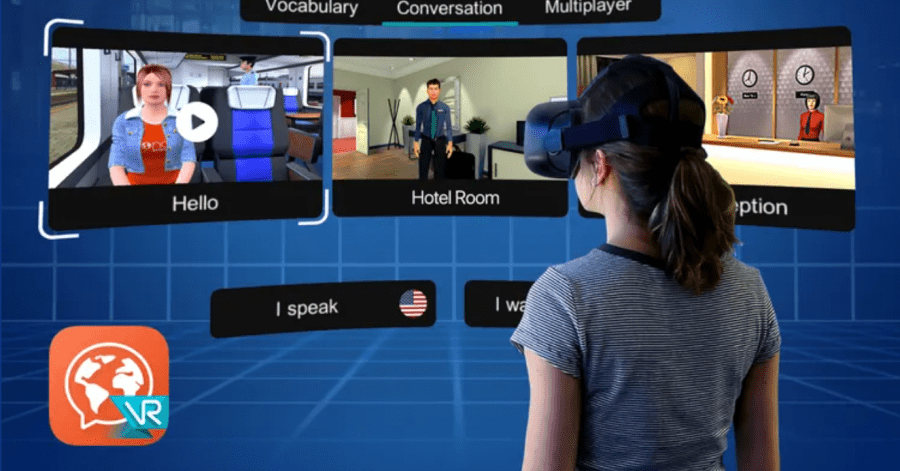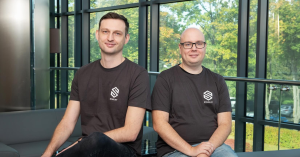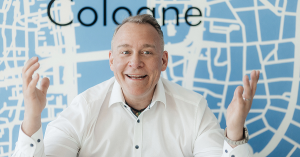In 2012, Alexandru Iliescu and Tudor Iliescu decided to quit their corporate jobs and immerse themselves in the world of building apps. “The idea to build a language learning app was first and foremost a labor of love, followed by years of research and hard work,” Alexandru Iliescu told The Recursive. Two years later, they launched Mondly from their native Brasov, a quiet city in Romania where they would have the ideal conditions to focus on the creative process.
According to Statista, Mondly was in the top 5 language learning apps worldwide by number of downloads in April 2021. But where did it all start? And what differentiates Mondly in the competitive industry of language learning?
The Recursive set out to find out in an interview with Alexandru Iliescu, who is also the company CEO. Former IBM consultant who experienced the life of Silicon Valley, Alexandru is now advocating for the use of technologies such as VR to improve the language learning experience – and growing Mondly as a leader platform in the field.
Making language learning fun through tech innovation
Native language recording is a key feature that helped differentiate Mondly in its early stages. Behind the language recordings there are real native speakers.
“Having worked in several European countries, we had to learn different languages from scratch. That was when we gradually noticed the needs the language learning market was having at the time and native voice recordings were probably the most important of them all. Listening and learning from native speakers is one of the most critical parts of learning a new language,” Alexandru explains.
Building on this, the company added another innovation: a chatbot tool that simulates audio-based conversations with native speakers, by playing recordings and allowing you to record yourself.
Mondly users appreciate a few other distinctive features of the app. For one, it covers some bespoke languages that not many other language learning tools offer, such as Afrikaans. It also emphasises context-based learning, teaching a word through examples of phrases that incorporate it. Mondly also added a hands-free module adapted to learning languages on the go.
To date, the app has reached 80+ million downloads across 190 countries and 41 languages.
“The scaling of the company was a natural process. Once Mondly took off, we knew what was coming if we worked hard enough. If you think small, your company will be small. The idea is to think bigger. And that’s what we did. We didn’t settle for good people. We hired the best people, the visionaries who speak the language of innovation fluently,” Alexandru added.
Their success is the result of bootstrapping alone, a practice that is more frequent in CEE versus the rest of Europe, in the absence of a developed VC scene.
“I think in a way, we avoided some challenges by not looking at raising outside capital, and directly monetizing the app instead. I see so many people struggling and spending time convincing people to give them funds, instead of just creating the product and getting the money from the customer,” said Alexandru Iliescu at the Techsylvania Conference a few weeks back.
How VR is shaping the future of immersive learning
From the get-go, Mondly set out to leverage innovative technologies to change the game for language learning. Back in 2017, the language learning app was among the first in the world to introduce VR technology.
Around the world, companies and organizations are starting to use virtual reality learning tools to connect knowledge with experience. The first accounts of VR systems used in education comes from the American Airforce, which used them in flight simulators. VR is most effective in creating digital spaces for simulations and training.
In language learning, Mondly uses VR to create an immersive experience, allowing users to enter a virtual reality where they can practice language skills in realistic situations, such as ordering food or talking to a receptionist in a hotel.
Presently, Mondly VR has 100,000 users to date. Its pioneer foot in the industry is recognized by the academic world, with more than 100 academic research articles highlighting its impact in advancing language learning.
Recently, Mondly VR was launched on Facebook’s Ocolus Quest, the newest and most advanced VR system on the market. Within a week of launching, they became the top selling educational app in the store, company officials say.
Elsewhere in the world, other platforms that offer VR-based language learning experience include ImmerseMe and VirtualSpeech.
“The VR industry has historically been dedicated to gaming experiences, but things are changing. Educational apps are ready to steal the spotlight. Thanks to the feeling of presence VR provides, language immersion, flight or surgery simulators are easily accessible. Students can acquire practical skills by doing,” concludes Alexandru.








